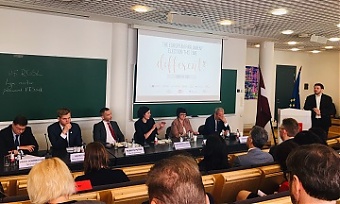Elections, EU – Baltic States, Latvia
International Internet Magazine. Baltic States news & analytics
Thursday, 22.01.2026, 22:54
Latvian political party representatives running for EP support increasing national contributions to the EU budget
 Print version
Print version |
|---|
The pre-election debate was moderated by the acting Rector of the Riga
Graduate School of Law Dr. Jānis Ikstens,
who in his introductory remarks highlighted the increasing role of the European
Parliament within the EU decision-making framework. The moderator emphasized
that the new EP will be in charge of approving the multiannual EU financial
framework, which could potentially accelerate or impede the convergence process
of Latvia. Dr. Ikstens also pointed at the overall slow growth rate of the
European Union in comparison to the United States.
Commenting on the current growth rate of the EU compared to the US and
China, debate participants acknowledged the need to increase national
contributions to the EU budget, invest more in science and innovation, and stressed
the need to reduce inequality both between and within the EU member states. The
debate also focused on the EU's core values, the question of fighting
disinformation and the Russian information war, and how to respond to and
benefit from the global migration flows. On the latter issue, the majority of
political party representatives expressed a reserved attitude towards accepting
mass migration, instead recommending strengthening external EU borders and
continue supporting aid programs in countries of origin of refugees and
migrants. During the pre-election debates, discussants repeatedly turned to the
question on how to ensure the most effective representation of Latvia's
interests at various EU institutions, including the European Parliament. Having
only eight out of 751 seats at the European Parliament, it is especially
important to elect knowlegable and experienced professionals who would be able
to effectively represent Latvia's interests and at the same time stand strong
for the core European values at the European Parliament at these turbulent
times, concluded debate participants.
The pre-election debate was organized by the American, British, German,
Irish, Norwegian, Swedish, and Swiss Chambers of Commerce in Latvia. The event
was supported by the Riga Graduate School of Law, META Advisory, VA
Government, Paulig and the World Federation of Free Latvians.








 «The Baltic Course» Is Sold and Stays in Business!
«The Baltic Course» Is Sold and Stays in Business!

